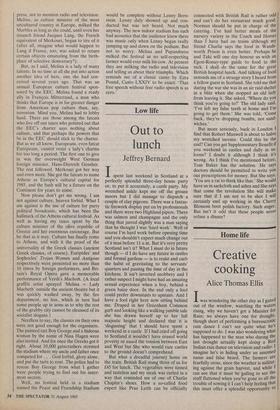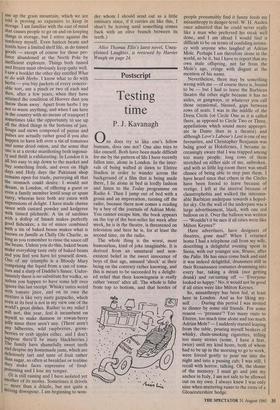Home life
Creative cooking
Alice Thomas Ellis
Iwas wondering the other day as I gazed out of the window, watching the waters rising, why we haven't got a Minister for Rain; we always have one for drought, though short of performing a bureaucratic rain dance I can't see quite what he's supposed to do. I was also wondering what has happened to the man who during the last drought actually kept doing a Red Indian rain dance on television and radio. I imagine he's in hiding under an assumed name and false beard. The farmers are fearfully cross, since the weather is militat- ing against the grain harvest, and while I can see that it must be galling to see the stuff flattened when you've gone to all the trouble of sowing it I can't help feeling that this must offer a splendid opportunity to use up the grain mountain, which we are told is proving so expensive to keep in storage. I am familiar with the cast of mind that causes people to go on and on keeping things in storage, but I strive against the tendency myself. Even haricot beans and lentils have a limited shelf life, as do tinned goods — except of course for those per- force abandoned at the North Pole by inefficient explorers. Things both tinned and frozen must obviously keep quite well. I saw a booklet the other day entitled What to do with Herbs. I know what to do with herbs — you buy packets of every conceiv- able sort, use a pinch or two of each and then, after a few years, when they have attained the condition of Hoover dust you throw them away. Apart from herbs I try not to waste anything, and when I am here in the country with no means of transport I sometimes take the opportunity to use up all the dried things in the bottoms of jars. Soups and stews composed of pastas and pulses are actually rather good if you also happen to have left over a tin of tomatoes and some dried onion, and the sense that one is at a stroke manifesting both ingenui- ty and thrift is exhilarating. In London it is all too easy to nip down to the market and buy something fresh, and even on High days and Holy days the Pakistani shop remains open for trade, purveying all that the stomach could desire. I would not dream, in London, of offering a guest or even a family member lentil soup or spam Corry, whereas here both are eaten with expressions of delight. I have made cheese sauce with custard powder and kedgeree with tinned pilchards. A tin of sardines with a dollop of Smash makes perfectly good fishcakes; a tin of mince combined with a tin of baked beans makes what is known en famille as Chilly Ole Charlie, as long as you remember to rinse the sauce off the beans. Unless you do this, baked beans make everything taste only of baked beans and you feel you have let yourself down. One of my triumphs is a Bloody Mary Comprising the liquid from a can of toma- toes and a slurp of Daddie's Sauce. Unfor- tunately there is no substitute for vodka, so Unless you happen to have some left over Ignore this last receipt. Whisky tastes weird with tomato juice, and on its own the mixture is like very nasty gazpacho, which even at its best is not in my view one of the world's great dishes. Rather to my relief I will not, this year, feel it incumbent on In. yself to make damson or rowan-berry Jelly since there aren't any. (There aren't any bilberries, wild raspberries, goose- berries or crab apples either, and I don't suppose there'll be many blackberries.) The family have shamefully sweet teeth and despise my homemade jams, which are deliciously tart and taste of fruit rather than sugar, so often at breakfast or teatime they make faces expressive of food- Poisoning and I lose my temper.
(It is still raining and I have isolated yet another of its modes. Sometimes it drivels more than a drizzle, but not quite a driving downpour. I am beginning to won- der whom I should send out as a little emissary since, if it carries on like this, I shan't be leaving until something comes back with an olive branch between its teeth.)
Alice Thomas Ellis's latest novel, Unex- plained Laughter, is reviewed by Harriet Waugh on page 24.











































 Previous page
Previous page